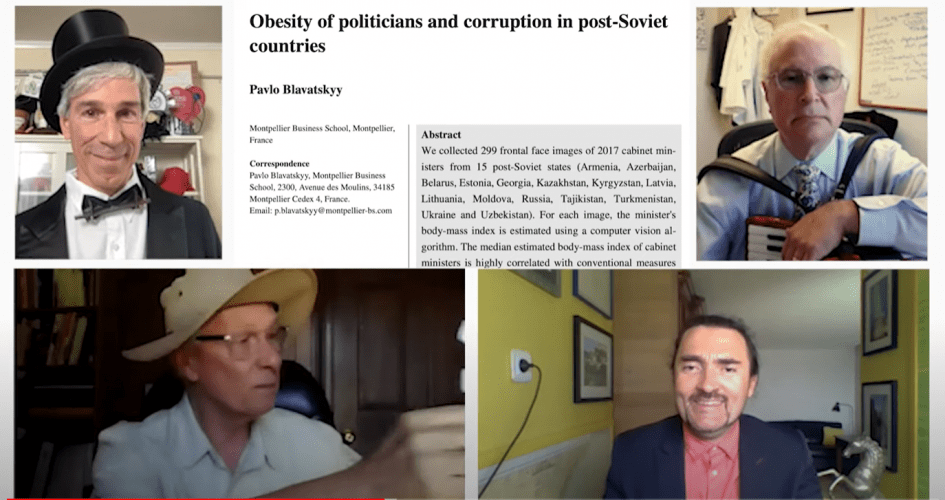Obesity of a country’s politicians may be a good indicator of that country’s corruption: 2021 Ig Nobel Winner

Obesity of a country’s politicians may be a good indicator of that country’s corruption | Source: Improbable Research
The 2021 Ig Nobel Economics Prize is awarded to Pavlo Blavatskyy for discovering that the obesity of a country’s politicians may be a good indicator of that country’s corruption. In the study, 99 frontal face images of 2017 cabinet ministers from 15 post-Soviet states (Armenia, Azerbaijan, Belarus, Estonia, Georgia, Kazakhstan, Kyrgyzstan, Latvia, Lithuania, Moldova, Russia, Tajikistan, Turkmenistan, Ukraine and Uzbekistan) were collected. For each image, the minister’s body mass index is estimated using a computer vision algorithm. The median estimated body-mass index of cabinet ministers is highly correlated with conventional measures of corruption (Transparency International Corruption Perceptions Index, World Bank worldwide governance indicator Control of Corruption, Index of Public Integrity). This result suggests that physical characteristics of politicians such as their body-mass index can be used as proxy variables for political corruption when the latter is not available, for instance at a very local level.
The 2021 Ig Nobel Prizes were awarded at the 31st First Annual Ig Nobel Prize ceremony, on Thursday, September 9, 2021. The event honours the achievements that make people laugh, then think. The prizes are intended to celebrate the unusual, honour the imaginative — and spur people’s interest in science, medicine, and technology.
Most of the new winners will give free public talks to explain if they can, what they did and why they did it. These talks, the Ig Informal Lectures, will be presented one at a time, over the coming weeks. Because of the Covid-19 pandemic, this year’s lectures will be presented online, here at www.improbable.com, rather than in a lecture hall in their usual home, MIT (the Massachusetts Institute of Technology).
The proceedings of the events can be watched here:
The 2021 Ig Nobel Prize winners
Biology Prize: Susanne Schötz for analyzing variations in purring, chirping, chattering, trilling, tweedling, murmuring, meowing, moaning, squeaking, hissing, yowling, howling, growling, and other modes of cat-human communication. Study reference: A Comparative Acoustic Analysis of Purring in Four Cats
Ecology Prize: Leila Satari, Alba Guillén, Àngela Vidal-Verdú, and Manuel Porcar, for using genetic analysis to identify the different species of bacteria that reside in wads of discarded chewing gum stuck on pavements in various countries. Study reference: The Wasted Chewing Gum Bacteriome
Chemistry Prize: Jörg Wicker, Nicolas Krauter, Bettina Derstroff, Christof Stönner, Efstratios Bourtsoukidis, Achim Edtbauer, Jochen Wulf, Thomas Klüpfel, Stefan Kramer, and Jonathan Williams, for chemically analyzing the air inside movie theatres, to test whether the odours produced by an audience reliably indicate the levels of violence, sex, antisocial behaviour, drug use, and bad language in the movie the audience is watching.
Study reference: Proof of Concept Study: Testing Human Volatile Organic Compounds as Tools for Age Classification of Films
Economics Prize: Pavlo Blavatskyy, for discovering that the obesity of a country’s politicians may be a good indicator of that country’s corruption.
Study reference: Obesity of Politicians and Corruption in Post‐Soviet Countries
Medicine Prize: Olcay Cem Bulut, Dare Oladokun, Burkard Lippert, and Ralph Hohenberger, for demonstrating that sexual orgasms can be as effective as decongestant medicines at improving nasal breathing.
Study reference: Can Sex Improve Nasal Function? — An Exploration of the Link Between Sex and Nasal Function
Peace Prize: Ethan Beseris, Steven Naleway, and David Carrier, for testing the hypothesis that humans evolved beards to protect themselves from punches to the face.
REFERENCE: Impact Protection Potential of Mammalian Hair: Testing the Pugilism Hypothesis for the Evolution of Human Facial Hai
Physics Prize: Alessandro Corbetta, Jasper Meeusen, Chung-min Lee, Roberto Benzi, and Federico Toschi, for conducting experiments to learn why pedestrians do not constantly collide with others pedestrians.
Study reference: Physics-based modelling and data representation of pairwise interactions among pedestrians
Kinetics Prize: Hisashi Murakami, Claudio Feliciani, Yuta Nishiyama, and Katsuhiro Nishinari, for conducting experiments to learn why pedestrians do sometimes collide with other pedestrians.
Study reference: Mutual Anticipation Can Contribute to Self-Organization in Human Crowds
Entomology Prize: John Mulrennan, Jr., Roger Grothaus, Charles Hammond, and Jay Lamdin, for their research study “A New Method of Cockroach Control on Submarines”. Study reference: A New Method of Cockroach Control on Submarines
Transportation Prize: Robin Radcliffe, Mark Jago, Peter Morkel, Estelle Morkel, Pierre du Preez, Piet Beytell, Birgit Kotting, Bakker Manuel, Jan Hendrik du Preez, Michele Miller, Julia Felippe, Stephen Parry, and Robin Gleed, for determining by experiment whether it is safer to transport an airborne rhinoceros upside-down. Study reference: The Pulmonary and Metabolic Effects of Suspension by the Feet Compared with Lateral Recumbency in Immobilized Black Rhinoceroses (Diceros bicornis) Captured by Aerial Darting
Observer Voice is the one stop site for National, International news, Sports, Editor’s Choice, Art/culture contents, Quotes and much more. We also cover historical contents. Historical contents includes World History, Indian History, and what happened today. The website also covers Entertainment across the India and World.

